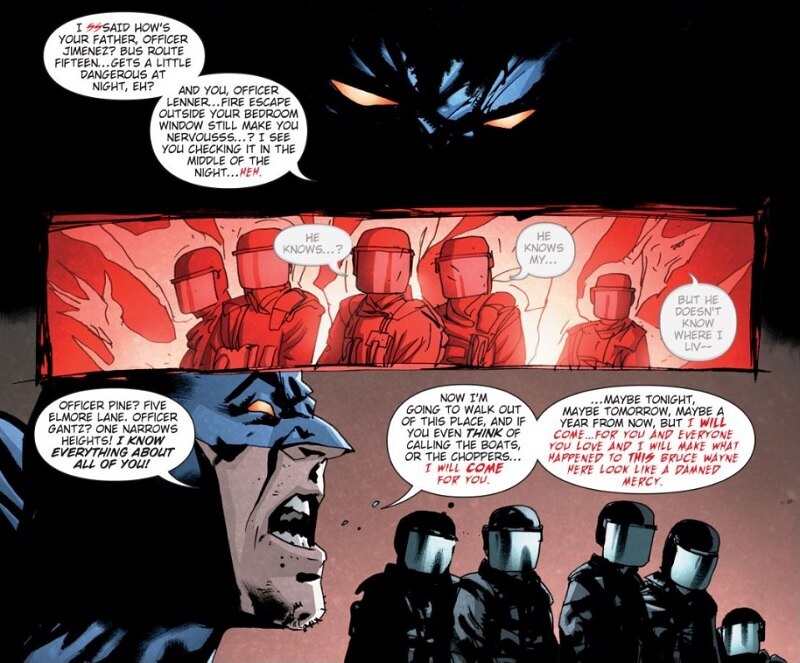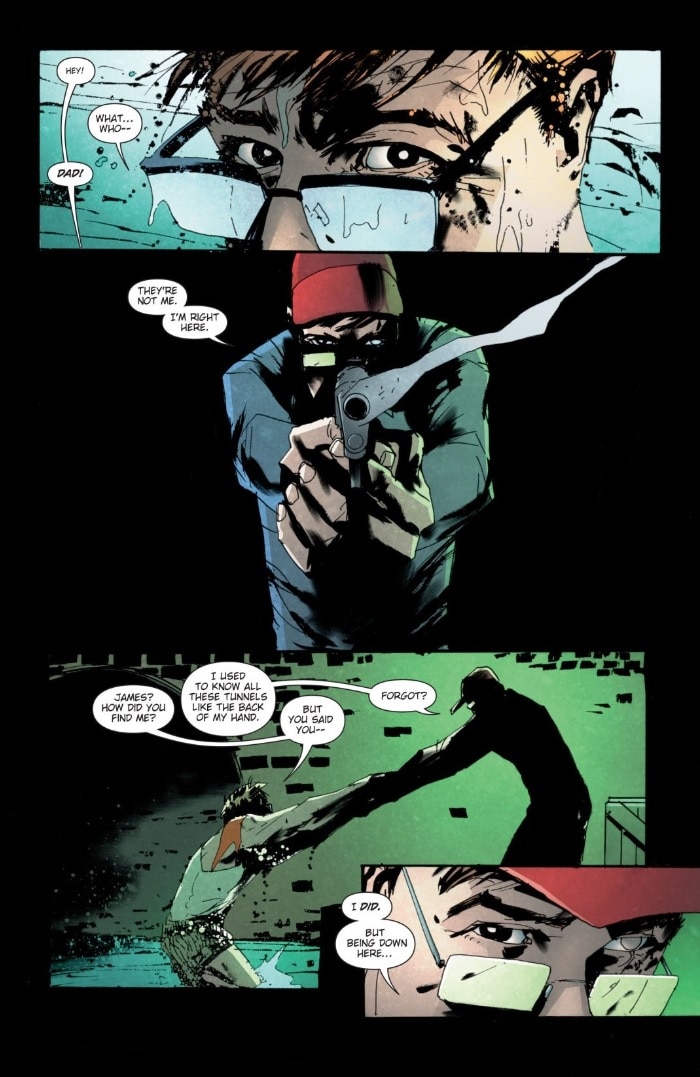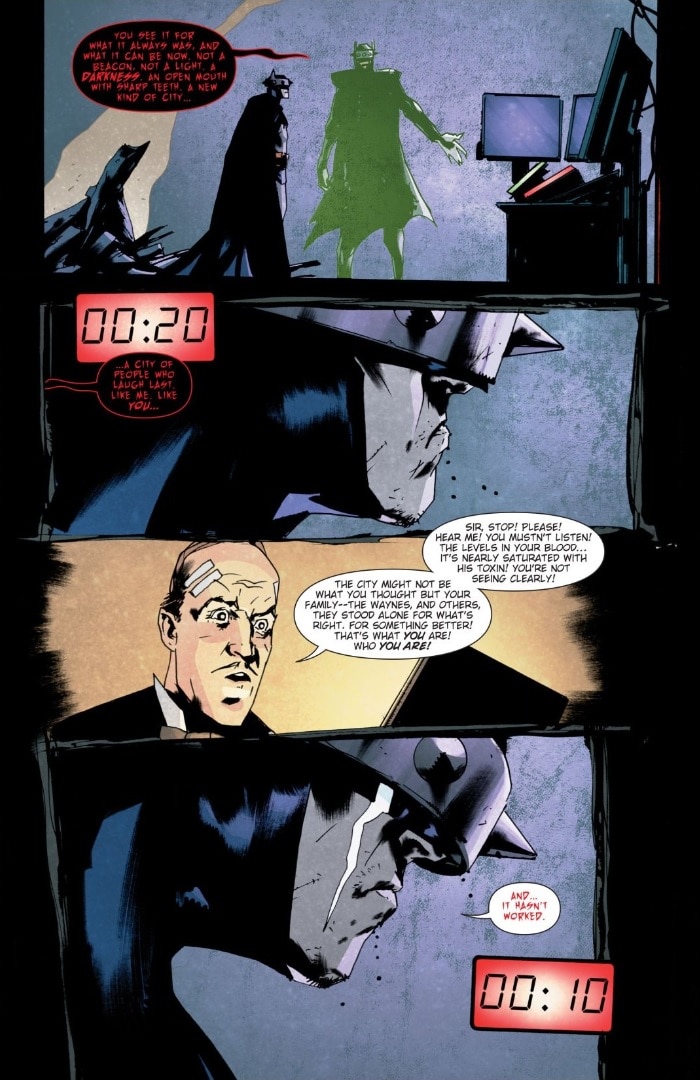Something that's constantly surprised me about The Batman Who Laughs miniseries is the focus on Bruce as a family man. It's one of the most interesting and important parts of who he is, but it's often sidelined in his more bombastic tales. After dissecting his habit of picking up waifs and strays and training them as vigilantes in the last issue, Scott Snyder and Jock delve into the impact that fathers have on their children in The Batman Who Laughs #5, and this time it's not just about Bruce.
One of the ongoing threads through this series has been Jim Gordon's relationship with his son. James Jr. was a key part of Snyder and Jock's earlier Batman story, The Black Mirror, which revealed that the young man was a sociopath with murderous tendencies. Since then James has been a recurring threat in the world of Batman, even becoming a fully blown serial killer. But here he's been given a strange chance at redemption, enlisted by Batman and his father to help them beat the Batman Who Laughs, utilizing his knowledge of the underground tunnels of Gotham.

Jim Gordon has always been the moral heart of Gotham, the balance between the brutality of its criminals and the single-minded vengeance of Batman. In bringing Jim and his apparently reformed son into his scheme, Bruce has put both of them at risk. That decision is brought to a head with one decisive and twisted play from the Grim Knight. At the end of the last issue we saw Gordon almost eaten alive by a group of violent Robins. Though it seemed like they were representations of Batman's broken children, they were in fact a gift to the Grim Knight from the Batman Who Laughs, each of them a warped clone of Jim's own son, James.
It's a bleak analogy for the trauma that Jim is wreaking on his son by wrapping him up in Batman's plan. James has paid for the crimes he committed and has spent time trying to reform himself and live a normal life. But the choices his father has made—and his priorities which once again skew towards his surrogate son, Bruce—put James, Jr. in danger in every possible world. As the gaggle of his grim sons chew at his flesh, Jim's true son has to do the one thing that he's been trying not to do since he was released—kill. He shoots the violent and tormented versions of himself in some kind of monstrous multiversal suicide.

This issue is all about people paying for the choices of others, with the allegedly responsible parties putting everyone in danger with their ever more reckless decisions. Batman's relationship with Gotham once again comes into play here too. After all, he can easily be seen as the father of the broken metropolis. He took the city under his wing, made it his mission, his passion, and it seems that here he will ultimately destroy it. It's a searing indictment of superheroics, of the idea that one man can change everything. It makes the statement that when you give one person that much power and make them near omnipotent, the only people who will ultimately suffer are the ones who put that trust in them. Here that is Gordon, his son and, of course, the people of Gotham.
Even surrogate father figures are having a reckoning here with Alfred finally losing control over the boy that he raised only to watch him become a monster. The Batman Who Laughs has always been bleak reflection of what Bruce could be, and Alfred is now faced with a harsh truth: no matter how much he loved his charge, looked after him and tried to guide him, it has all been for naught. Could he have taken a more active role? Maybe he could have tried to talk Bruce out of his life as a crimefighter. But as Bruce pushes the self-destruct button on him and Gotham, it becomes all too clear that something, somewhere went horribly, terribly wrong.

The shadow of absent fatherhood looms large over Batman's eight-decade history, and here that loss in that fateful night in Crime Alley comes full circle. Bruce is nothing but a little lost boy, lost in his obsession with fighting crime, lost in his feud with the Joker, losing himself in the toxin that is infecting his blood. Thomas' absence has become the stick that Bruce beats himself with, and as he finally says goodbye to the last vestiges of the man he once was, the place that he dedicated himself to, and the mission that he consumed himself with, it's obvious that he never truly escaped Crime Alley or the trauma that he faced there. Perhaps that's why it was so easy for him to look the abyss in the face and embrace it.
The Batman Who Laughs #5 by Scott Snyder, Jock and David Baron is now available in print and as a digital download.
Rosie Knight writes about comics, movies and TV for DCComics.com and DCUniverse.com. Be sure to follow her on Twitter at @RosieMarx.




















